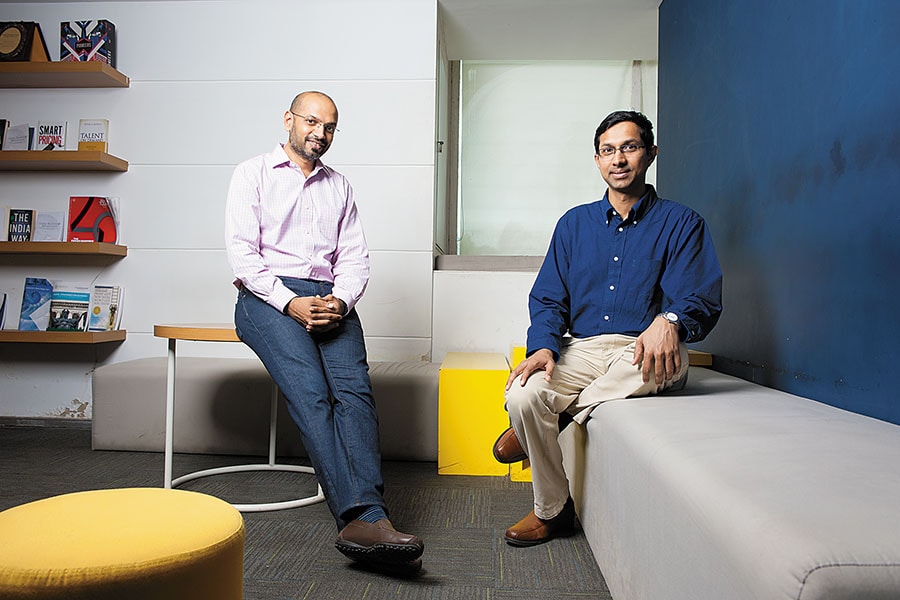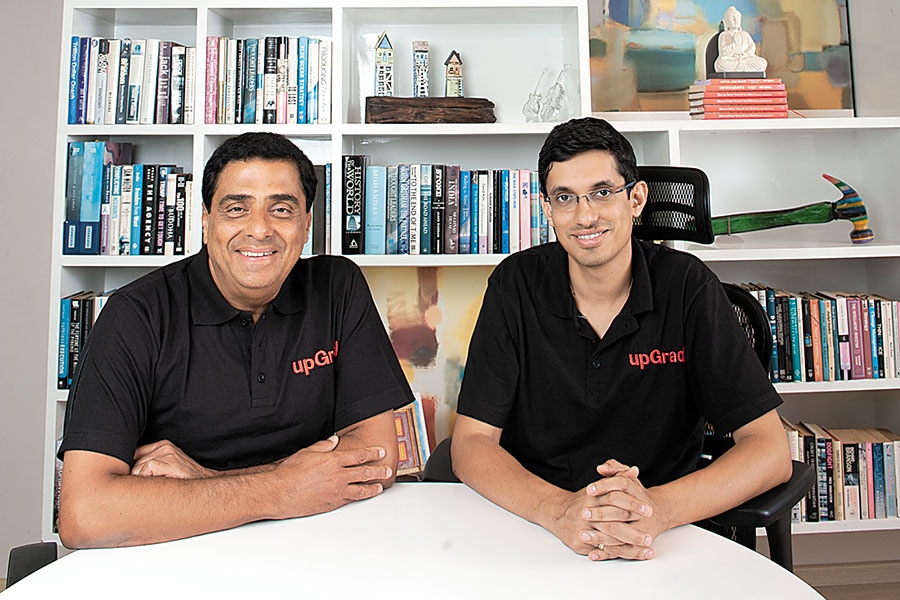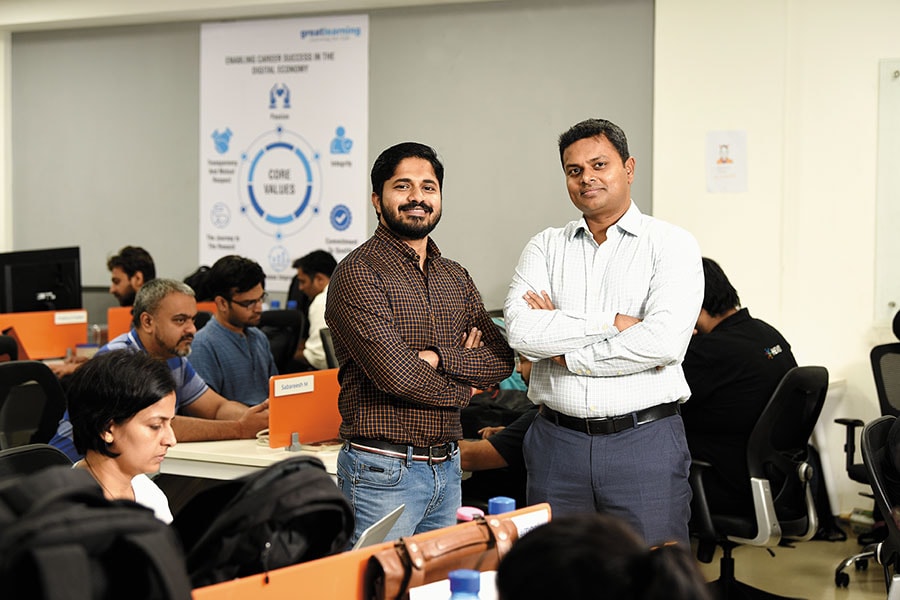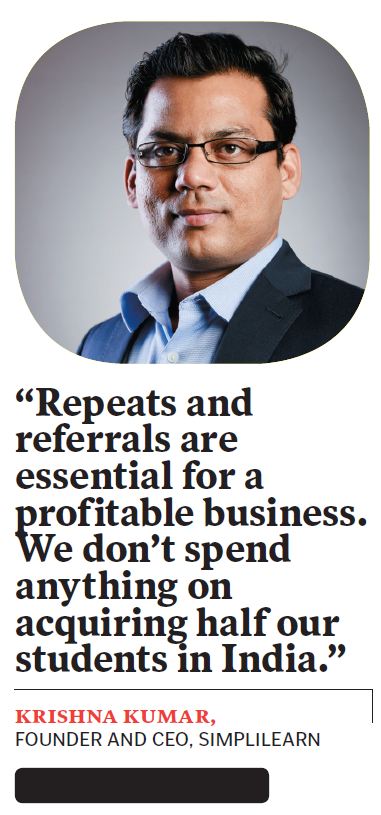
Beyond MOOCs, e-learning is India's Renaissance bet
Online courses from India—from players such as SimpliLearn, Upgrad and Great Learning—are providing domestic and global learners with the knowledge and skills to upgrade themselves, while building high-margin businesses
 (From left): Chaitanya Kalipatnapu and Ashwin Damera, Eruditus Learning Solutions: Going international by collaborating with foreign universities
(From left): Chaitanya Kalipatnapu and Ashwin Damera, Eruditus Learning Solutions: Going international by collaborating with foreign universitiesImage: Mexy Xavier
In 2015, American investor Lee Fixel was in Bengaluru to meet Krishna Kumar, founder and CEO of SimpliLearn. Fixel, a partner at private equity (PE) fund Tiger Global, had built a reputation for identifying high-volume businesses in India that were ripe to go online.
Under Fixel, Tiger Global had capitalised Flipkart, Ola and Freshworks at early stages, before any other fund was willing to write big-ticket cheques for internet companies from India. Kumar had started SimpliLearn as a blog in 2010 for working professionals in the IT sector. It sold certification programmes online, which were designed with companies like IBM to train people in emerging areas like cloud computing and project management.
Neither Fixel nor Kumar talked money as it wasn’t a meeting to close a deal. The former was on the lookout for a high-volume opportunity in education technology that was focussed on the Indian market. (Earlier this year, Tiger Global closed a deal with Vedantu, a learning platform for students who want to crack board and competitive exams like IIT-JEE.) But when Fixel met Kumar, the latter wanted to take SimpliLearn global, and not restrict it to India.
The two did not meet again. (Fixel quit Tiger Global this May.) From the start, Kumar wanted SimpliLearn to be in a growing segment of customers with an increasing wallet-share for learning technology. The re-skilling video platform claims to have between 50,000 and 70,000 learners participating in live online sessions at any time of the day. It has 2,000 instructors who teach working professionals in India, the US and the UK, Australia and Singapore. Kumar’s decision has since had three positive fallouts.
One, with India’s economy slowing down—GDP growth was 5 percent this June—it is a good time for professionals to start new ventures or learn new skills that can help further their careers. Two, the highly capitalised startup ecosystem is hiring technology talent in large numbers, making knowledge and certification of new-age technologies a must for IT professionals. And three, other seasoned entrepreneurs—with a strong bias towards high-gross margins—have followed in the steps of SimpliLearn; they, too, have taken renaissance bets.
 Ronnie Screwvala (left) and Mayank Kumar of Upgrad: Counselling the online learner is vital
Ronnie Screwvala (left) and Mayank Kumar of Upgrad: Counselling the online learner is vitalImage: Mexy Xavier
Founders’ Quotient
Ronnie Screwvala co-founded Upgrad in 2016 with Mayank Kumar, managing director. Focussed on the domestic market, it has around 3.65 lakh learners registered on its platform, almost 15,000 of whom pay for re-skilling courses.
“This is my a) first, b) proper, and c) only internet business,” says Screwvala, who founded UTV in 1990, charting a long path into television and film production, before selling the company to Disney in 2012. Mayank Kumar says re-skilling is in its third stage of evolution. In the first phase, until 2011, content providers made education-content (predominantly text) accessible online. In the second phase, education content began to be available online in video, though bandwidth was an issue. “We are in the third wave, where online content delivery is seamless. But it is bringing with it the need for a lot of human touch or offline hand-holding,” he explains.
Then, there is Ashwin Damera’s Eruditus Learning Solutions, co-founded with Chaitanya Kalipatnapu, in 2011. Damera was co-founder of Travelguru in India, a hotel-aggregator website in 2005, long before the likes of Oyo entered the directory of internet ventures. He has now built a global business from India. Eruditus has 30,500 paid learners across India, the US, Latin America and Europe. It has raised $50 million in three rounds of funding, most notably from Sequoia in January.
 Hari Krishnan Nair (left) and Mohan Lakhamraju of Great Learning: Focussing on the careers of learners
Hari Krishnan Nair (left) and Mohan Lakhamraju of Great Learning: Focussing on the careers of learnersThere is also Mohan Lakhamraju, who co-founded Great Learning in 2013 with Hari Krishnan Nair and Arjun Nair. As vice chairman and CEO of Great Lakes Institute of Management in Chennai, Lakhamraju began Great Learning to provide blended learning (online-plus-classroom training) . In the past three years, he says, it has evolved into a platform with 1 million registered users, of which around 14,000 pay for the courses.
The focus on working professionals has never been more pronounced in the internet industry. And Kumar of SimpliLearn is happy. “All of them are doing well. They are investing money, which is building this market to serve working professionals. Our message is the same: Take charge of your career,” he says.
By going global, SimpliLearn and Eruditus have expanded their ability to monetise and get more customers.
The India Way
Screwvala isn’t one to let context escape opportunity. Less than a week after food-ordering app Zomato let go of 540 employees in September, he addressed them on LinkedIn. “We can help you prepare for your next job. Companies have to take some hard calls, especially in an era where technology is disrupting manual intervention and helping organisations scale effectively,” he wrote, before pointing to an Upgrad course for customer support teams.

Pedigreed companies like NIIT focussed on skills training as far back as the 1990s. That model comprised the franchising of classrooms with personal computers to reach graduates around India. The opportunity was in monetising fresh graduates, who sought to grow their certifications before they entered the jobs market. The technology sector was nascent.
In contrast, the training business can now harness a large part of the technology workforce. What’s also different is the paying capacity of working professionals, as IT and business processing management in India has become a $181 billion industry, according to Nasscom. Last year, more than 6 lakh professionals became digitally skilled, it adds. This could be on account of IT employers undertaking the expense, or professionals paying for continued learning.
The battery of re-skilling platforms is growing its presence in both business-to-business as well as business-to-consumer opportunities. And improved online connectivity and advanced devices have made it possible for internet companies to harness video content for learning programmes.
For an entrepreneur from the television era, the internet appealed to Screwvala as a “two-way” medium to deliver education.
“It is an interactive medium. And there is the prospect of creating a learning experience, so that users don’t miss going to a university. The ability of people to post questions and get answers right there from peers, study groups or faculty and mentors is high,” he explains.
The delivery model from India is different compared to the US, where massive open online courses (MOOCs) captured the public imagination in 2011. Companies like Coursera, Udacity and EdX promoted the idea of self-learning platforms that host well-produced videos for professionals and students. In India, the role of the instructor is vital for learners, says Kumar of SimpliLearn. The human interface is vital in four areas: Designing the course material, advisory services to learners before they select a course, student support, and career placement.
Human Factor
“Unlike a MOOC, we are not telling universities to just put their content on our platform and monetise it. We work with their faculty and recreate the course from scratch. This is a six-month cycle,” says Damera. Eruditus works with 12 universities, including Harvard Business School, Berkeley, Massachusetts Institute of Technology (MIT) and Wharton, to develop the course material. It is able to charge a premium because of these partnerships.
“MIT has spent 150 years perfecting how to do research and teach. It has an annual budget of $2.5 billion. We can’t match that. Why would I want to be an academic institution that tries and creates resources if I can partner with them?” says Damera.

Eruditus has managed to repurpose its brand-led course content in Spanish, and build a customer base in Ecuador, Mexico and Guatemala. India forms less than 20 percent of its customer base. Damera has been able to go global because of university partnerships and build a venture from India with a $145-million revenue run rate.
While Upgrad is more focussed on the local market, it has built nine partnerships with universities and institutes, including Mica in Ahmedabad, IIIT (International Institute of Information Technology) in Bengaluru, and Bits Pilani. “There is a lot of hand-holding and human touch necessary in India. It isn’t just about online content,” says Kumar of Upgrad, referring to 150 graders on their platform across India, 150 industry experts, 60 teaching associates, and 40 faculty members. This has led to nearly 8 lakh counselling sessions for learners during and after the courses.
Great Learning has evolved in the same direction, building on partnerships with 220 companies. “We have put a significant emphasis on career track,” says Lakhamraju, adding that they have worked on helping learners get mentorship from relevant experts. “That way, these companies have access to the talent we train. And the talent gets to understand the needs of new jobs in companies.”
Lakhamraju declines to share details of Great Learning’s headcount, but its employee base has touched 500. It has the Flipped Classroom model, whereby learners study individually on the platform during the week. Then, they have a live interactive session in a small group with the instructor over the weekend. Similarly, an online mentor-learning facility brings personalisation as a learner can have the same mentor. “In some sense, the mentor takes ownership for your learning. That personalisation ensures high-quality learning outcomes in an online setting,” says Lakhamraju.
Damera says these local needs are peculiar to SPOCs (small private online courses) from India. It’s why Eruditus has a tele-sales team of 200 programme advisors, another 100 employees for 24x7 student support, and 70 in marketing. That’s more than two-thirds of its 550-people global headcount. Upgrad’s headcount has touched 450.
None of the players has figured out the perfect method of delivery yet—the ratio of content, technology and offline hand-holding. “We still need to get that critical mass to a level where we feel we are getting results,” says Screwvala. “Right now, we need to solve the problem of building credibility and getting people online, convincing them that this medium is as good as going to a university. With re-skilling platforms, they are not losing a year, or the opportunity cost [of a salary].”
The gross margins can range between 30 percent and 40 percent, according to estimates. But the process of keeping the learner engaged until a course concludes, and growing the number of customers, erodes the profitability of what is not a commoditised business.
Says Kumar of SimpliLearn: “The one thing essential to build a profitable business is: Repeat and referral. This is traditionally a referrals business. So, we don’t spend any marketing dollars on half the students SimpliLearn acquires in India.”
The Platforms Are Learning
For now, the platforms of Indian service providers are getting more intelligent because of the range and growing volume of learners they are attracting. Analytics help understand learning habits, and make the platform more responsive with features to suit these habits.
At Eruditus, the Learning Analytics team in Mumbai does R&D activities on learning habits of its users, based on working professionals’ behaviour in each of its geographies. “They have a lot of time-commitments apart from learning. Against that tide, our course-completion rates have to be high,” says Damera.
Universities traditionally release new modules on Mondays. But Eruditus Learning Analytics team found two kinds of behaviour. ‘Set 1’ comprised learners who spent 30 to 60 minutes twice or thrice a weekday to study. ‘Set 2’ learners start on Saturday and Sunday, and put in four hours at a stretch. They go to office on a Monday morning, and submit the assignments from there.
“So, if we start a weekly module on Tuesday or Wednesday, it is optimal for both sets,” says Damera. How important is that? “Earlier, nearly 30 percent of our students would seek extensions for their assignments. That number fell to 12 percent,” he adds. Analytics is also helping personalise features.
That’s why if the slowdown has come as a rude shock for working professionals, now is a good time to find the skill they want to build. The choices are aplenty on the information highway.
(This story appears in the 30 November, -0001 issue of Forbes India. To visit our Archives, click here.)






